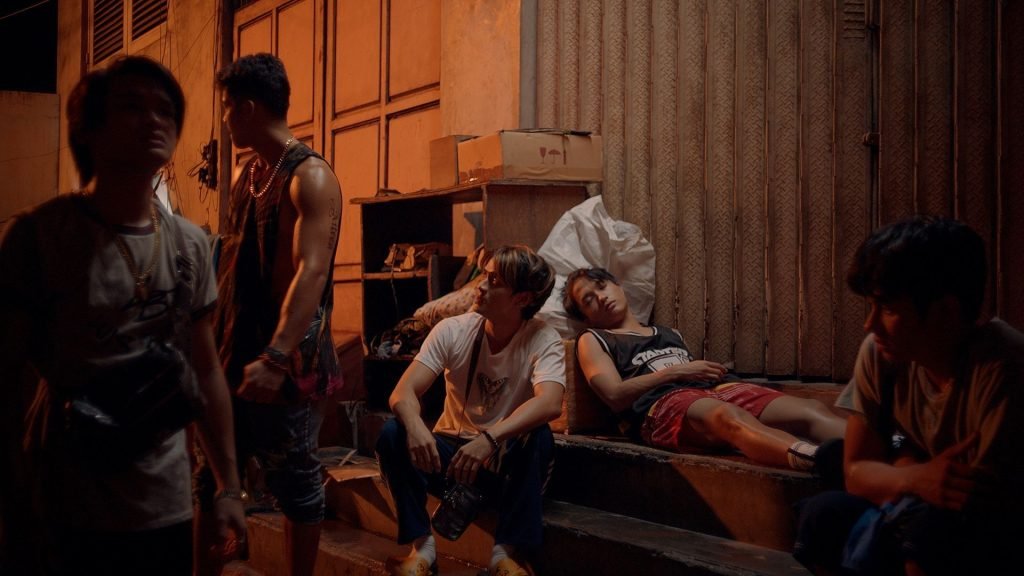Manila’s streets are hot and sweaty and hold stories of survival and struggle. Wrapped in the chaos of Southeast Asia’s most densely populated cities, Some Nights I Feel Like Walking (2024), directed by Filipino writer-director Petersen Vargas, invites its viewer to lean in close and listen to the story that unravels under the flickering streetlights. In Vargas’ fifth feature work, which screened most recently at XPOSED Queer Film Festival Berlin (29 May–2 June) after premiering last autumn in Tallinn Black Nights‘ Official Competition, it’s not just the city’s overwhelming nature but also the intimate distance of friendship and chosen family that grips us tightly.
At the centre of this story is the often stigmatised sex work industry in the Philippines. Within this reality exists a young hustler, Uno (Jomari Angeles), and the Bambi-eyed newcomer, Zion (Miguel Odron in his first feature film role), who primarily service male clients. After their mutual friend Rhoda dies from a drug overdose, Uno naturally takes Zion under his wing. However, rather than offering yet another narrative centered on sexual exploitation, the film approaches the subject through empathy. What unfolds is less a conventional plot and more a slow depiction of grief, longing, and intimacy. Their relationship, deliberately undefined, lingers at the periphery between platonic and romantic; the film never insists on labelling what they are to each other—but rather, how their close presence can help cope with tragedy.
Overall, there’s something beautifully messy about the film. Vargas, whose earlier feature 2 Cool 2 Be 4gotten made him a key voice in queer Filipino cinema, brings both a political and poetic lens to this story. Raised in Pampanga and once a political science student, his shift to filmmaking reflects the changes his characters undergo, from theory to flesh. Some Nights I Feel Like Walking extends his sleek but gritty aesthetic of social realism, situating us firmly in Manila’s nocturnal geography. What the film manages to deliver is a sense of naturalism that avoids skipping any crucial moments. From the film’s crucial tragic event until the very end, we see the boys continuously trying to find a way to overcome it together. The city here is not a mere backdrop but a heterotopic space that is equally vibrant and brutal. Rhoda’s death catapults a chain of events that shakes their already fragile sense of direction, forcing them to leave behind the last bits of childlike confusion they can no longer afford to feel. What starts as a narrative about boys engaged in sex work evolves into a bittersweet road movie of sorts, a journey as unfortunate as it is the sad reality.

The way Manila is depicted is through cusps of fog, neon lights, and tight alleys (with cinematography by Russell Adam Morton) that open into existential freeways. This layered urbanity mirrors queer existence itself, where a constant negotiation of visibility, alienation, and the need to belong is on the highest of pedestals. Wearing its atmosphere like a second skin, what enhances the film’s visual language is Vargas’ decision to depict the course of events over one night. Everything is a bit wet, dirty, and covered in hues of pink and purple—even some of the motorcycles are flashy neon—it’s stunning, but sometimes a little too eager to be stunning.
Because here’s the rub: for all its visual rawness and emotional promise, something doesn’t quite land. Uno and Zion’s chemistry never fully reaches a place where it’s fully convincing. Despite the trauma bonding and late-night tenderness, the performances lean into melodrama, and the intimacy occasionally feels performed rather than lived. The fog machines work overtime, and the cinematography sometimes seems to chase an aesthetic climax the characters themselves never reach. At times, it’s as if the film is searching for a word it has unfortunately forgotten.
Some Nights I Feel Like Walking is far from perfect, but maybe that’s the point. It offers neither clean answers nor a complex story with a wild new perspective on queer identity. What it does give us is a flawed portrait of queer youth navigating a world quietly stacked against them. For those who’ve ever found family in unexpected places, or who’ve stumbled through cities with someone else’s weight on their shoulders, this film will feel like a hand gently reaching out in the dark.





